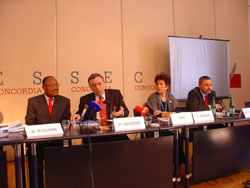The launch of the INCB 2004 Report by INCB President Professor Hamid Ghodse, INCB Board Member Rainer Wolfgang Schmid and INCB Secretary Koli Kouame was held in the Concordia Press Club, Vienna at 11 am today. Nasra Hassan, Director UNIS and Spokesperson UNODC chaired and moderated the press briefing.

Mr. Ghodse discussed the problem of illicit Internet pharmacies, saying that they were replacing classic drug trafficking channels. Investigations had shown that 90 per cent of the drugs sold on the Internet were sold without a prescription. The INCB President also referred to a significant change of the Dutch cannabis policy on which there had been a total “media silence” so far. A recent Dutch inter-ministerial policy paper had acknowledged that cannabis was “not harmless” and that coffee shops were “not blameless” in the maintenance of the illicit drug trade. The Dutch action was a step in the right direction towards full compliance with the international drug control treaties.
The President also spoke about the drug control situation in Afghanistan, saying that it was a cause of concern for the Board. He expected that President Karzai would take immediate action to address the increasingly serious drug problem in his country. If Afghanistan were to develop into a “narco-State” as some feared, democracy would “fly out the window”.
The presentation was followed by a Q&A session.
In response to a question on how it was possible, in practical terms, to combine strategies aimed at reducing drugs demand and supply, Mr. Schmid said that it was important for key players in governments to exchange information more efficiently -- “ultimately, they are working towards the same goal. There should be no conflict in their approach,” he said.
In response to a question on how sales of illicit drugs on Internet pharmacies were growing, Mr. Ghodse said that the INCB had first noted sales of illicit drugs via illegal Internet pharmacies in 1995, and could confirm that the problem has been increasing. He said the INCB was urging governments to exchange information on seizures in a speedy manner and to develop legislation to tackle the issue. Mr. Schmid added that more and more sites were selling medicines containing internationally controlled substances without prescription, potentially fatal drugs packaged alongside vitamins.
To a question on the view of INCB on drug injection rooms, Mr. Ghodse said the drug injection rooms were against the international drug control treaties because they violated their central principle, namely that the use of drugs should be limited to medical and scientific purposes only. Mr. Schmid added that drug injection rooms were facilitating behaviour that was both illegal and damaging and that the drugs abused in injection rooms came from the illicit market.
Mr. Kouame responded to a query on how proceeds from drug trafficking were financing civil conflict in Africa, saying that images of child soldiers with weapons in one hand and drugs in the other were well documented. He said that there was a lot of evidence of the linkages between the two, adding that besides civil conflict, drug trafficking also fuelled social problems.
The briefing was well attended by 40 media representatives from leading international news agencies (ANSA, Reuters, Agence France-Presse, Associated Press), Austrian newspapers (Der Standard, Wiener Zeitung), radio (Radio Max, ORF, Dutch Radio), and TV (ORF), besides local NGOs and representatives from permanent missions in Vienna.
* *** *